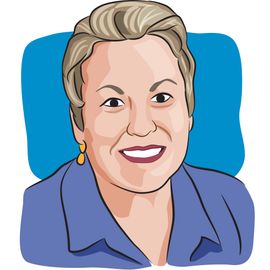- About Us
- Advertise / Support
- Editorial Board
- Contact Us
- CancerNetwork.com
- TargetedOnc.com
- OncLive.com
- OncNursingNews.com
- Terms & Conditions
- Privacy
- Do Not Sell My Information
- Washington My Health My Data
© 2025 MJH Life Sciences™ and CURE - Oncology & Cancer News for Patients & Caregivers. All rights reserved.
Web Exclusive: Standing Up to Cancer

Kathy LaTour is a breast cancer survivor, author of The Breast Cancer Companion and co-founder of CURE magazine. While cancer did not take her life, she has given it willingly to educate, empower and enlighten the newly diagnosed and those who care for them.
Movie producer Laura Ziskin's diagnosis of advanced braest cancer led her to develop a new research-funding strategy.
Laura Ziskin says she failed at knitting and meditation, which friends told her would help calm her during her treatment for stage 3 breast cancer in 2004.
“Knitting was a real disaster,” says the 60-year-old film producer. Instead, Ziskin turned to what had always provided distraction and joy—her work. Ziskin says when she learned there were others in her industry who wanted to do something to raise money for cancer research, she signed on. The result: she became executive producer of a one-hour, live fundraising event called Stand Up To Cancer (SU2C), which aired on the three major networks simultaneously in fall 2008.
Ziskin became an advocate after her own diagnosis, which was delayed by constant reassurances from physicians that nothing was wrong. She underwent a mastectomy that revealed 30 positive lymph nodes and one lymph node that, because of its location, could have meant she was stage 4 but was inconclusive. She underwent chemotherapy, had a stem cell transplant, and then radiation. It shocked her to learn that her prognosis was no better than women who received the same diagnosis 40 years ago.
An Inconvenient Truth
“I produced the Academy Awards in 2007 and watched how the movie shifted the conversation in the country about climate change,” Ziskin says. “I am in the media business, and I should use the bully pulpit to push people.”
SU2C, www.standup2cancer.org, featured more than 100 celebrities who performed and educated the audience about cancer, ultimately raising more than $100 million for cancer research.
Ziskin says that before the event, she and the other co-founders of SU2C had determined that the greatest need was to accelerate cancer research results through collaboration.
I believe that I’ll go along and that this will stop working, and then I’ll have something else that will cure me.
“We wanted to fund translational research, the research that will be brought to patients the fastest,” Ziskin says. The research “Dream Teams” they envisioned would be multi-institutional and cross-disciplinary.
On May 27, 2009, one year after its launch, SU2C funded its first of five Dream Teams. It wasn’t a minute too soon for Ziskin, who had learned in April that her cancer had metastasized to her liver. She began a phase 1 trial of an investigational drug for hormone receptor-positive breast cancer, already being studied with funding from SU2C. The drug is now in phase 2 testing. Ziskin, who continues to take the experimental treatment along with two other approved therapies, reports that her cancer is stable.
“I believe that I’ll go along and that this will stop working, and then I’ll have something else that will cure me,” Ziskin says, adding that she has had a biopsy of the liver tumor to determine its molecular profile, which may be useful if a new targeted treatment option is developed.
Spiderman
In the meantime, Ziskin says she is working on the next movie and a new play about Enron, as well as the second SU2C live telecast scheduled for September 10. The projected profit from the second cancer fundraiser, she says, will be used to remove barriers to creativity and collaboration by enabling scientists with varying expertise from different institutions across the country—and in some cases internationally—to work together toward a cure.
Related Content:



